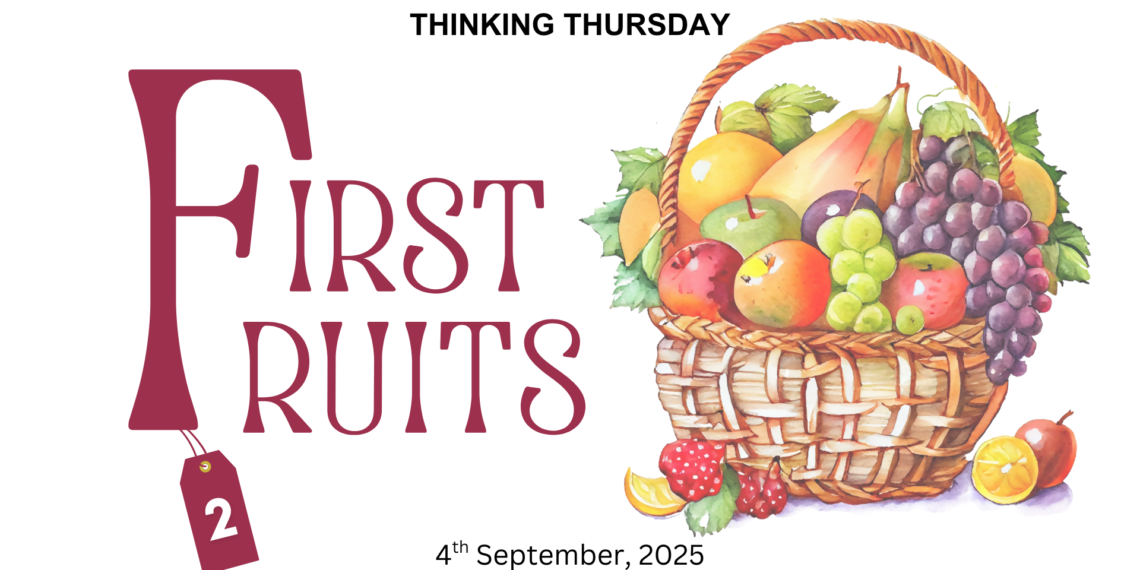You’ve been introduced to the subject, and you’ve had some time to think. Now, let’s carefully examine what the truth is about this often–debated topic: First Fruits.
The First of the Harvest
As the word implies, first fruits are the fruits that mature first when you harvest your crops. After that, your plants will continue to bear more fruits, but those are no longer the “first.”
From the Scriptures, giving your first fruits is really about bringing the first of your harvest before God as an act of honor, acknowledging Him as your Provider, while still partaking of the fruits of your labour.
Beyond the January Salary Tradition
The term “first fruit” is not about giving away your January salary. It holds deep symbolic and prophetic meaning throughout Scripture. Let us look at its origin and address some of the questions we raised last week.
READ BEFORE: FIRST FRUITS (PART 1)
The Israelites and Their Practice
First, we’ve seen that the Israelites were an agrarian people. They cultivated the land and harvested their fruits at specific seasons. They did not receive monthly salaries.
Also, God expected them to bring some of the first fruits to His house, not everything (Deut. 26:2). If you’re harvesting maize, especially on a large piece of land, you don’t harvest everything at once. You may harvest a third of it first. Even then, you’re not told to give all of that one-third, but some.
The Lord asked for a portion, as honor to Him and provision for His servants. The people were to bring some of their harvest to the priests and declare how God had brought them into the land. It was a recognition of God’s faithfulness and provision (Deut. 26:3-11).
READ ALSO: SHOULD CHRISTIANS TITHE? (PART 3)
The One Who Partakes First
“The husbandman that labors must be first partaker of the fruits.” (2 Timothy 2:6)
The Bible says that the farmer who labors has the first right to enjoy his labor. It is God’s will that you, who labored, partake first of the fruits (Eccl. 3:13; Isa. 65:21–22).
It is against the will of God that you labour, others consume the fruit, and you are left with nothing. Scripture shows that God Himself insists that a man must partake of what he worked for:
- If a man marries, he must first enjoy his wife before being sent to war (Deut. 24:5).
- If a man builds a house, he must first live in it before being sent to battle (Deut. 20:5).
- If a man plants a vineyard, he must first eat of it before another does (Deut. 20:6).
God takes this principle seriously. He does not enjoy seeing His people suffer needlessly. He wants you to enjoy the fruits of the works of your hands.
It wasn’t about taking everything from the first harvest. It was about taking the best part of the fruit that ripens first and acknowledging that God is the one who brought you into the land and gave you success (see Exo. 34:26, Num. 18:12–13).
READ ALSO: SHOULD CHRISTIANS TITHE? (PART 4)
Shared Joy in Labour
There is to be shared joy in labour. Scripture says: “He that reaps and he that sows may rejoice together” (John 4:36).
So, when you plant and harvest, you rejoice. And when your pastor, priest, or spiritual leader partakes of the first fruits, he also rejoices. But if one party is left empty while the other takes everything, that is not God’s order.
The principle remains: both the laborer and the servant of God should partake of the harvest, not one at the expense of the other.
Today, some preachers insist that believers must give 100% of their January salary as “first fruits.” That teaching, however, is not scriptural. A person may freely choose to honour God in this way if they desire, as a personal act of devotion at the beginning of the year. But it is incorrect to present it as a biblical command.
What God actually desires is that we honour Him and acknowledge Him as our primary provider in every area of life. The Scriptures speak of offering Him the first and the best—not only in money, but also in other dimensions of life. For example, the first fruits of:
- Time
- Praise
- Children — “Consecrate to Me all the firstborn, whatever opens the womb among the children of Israel, both of man and beast; it is Mine” (Exodus 13:2).
The wisdom of Proverbs reminds us: “Honor the Lord with your wealth, and with the first fruits of all your increase” (Proverbs 3:9).
Proverbs 3:9: “Honor the Lord with your wealth, and with the first fruits of all your increase”.
And people can choose to show this honour in different ways. But we must not labour under man-made rules that cause us grief and make us dependent upon others. If we can do this without being a nuisance to anyone, fine and good. But be aware that it is not the Lord who demands it in this form.
In the next part, I will share a personal experience…
READ NEXT: FIRST FRUITS (PART 3)
Join us on this series on Women in Ministry as we address controversial questions and settle age-old church disputes.










